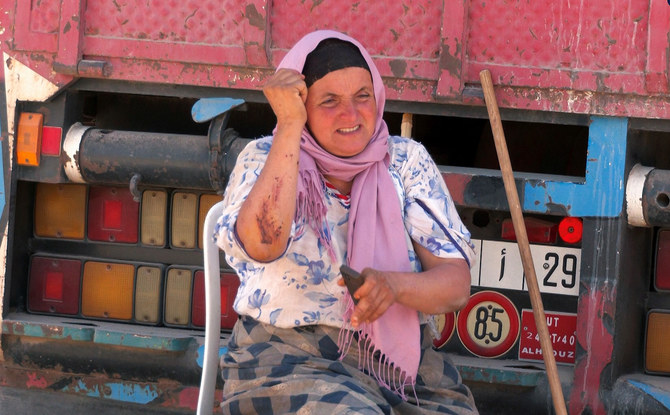TALAT N’YAAQOUB, Morocco: Many survivors of Morocco’s earthquake struggled in makeshift shelters on Tuesday after a fourth night in the open, while villagers in devastated mountain areas voiced frustration at having received no help from the authorities.
The death toll from the 6.8 magnitude quake that struck in the High Atlas Mountains late on Friday evening rose to 2,901, while the number of people injured more than doubled to 5,530, state television reported.
It was the North African country’s deadliest earthquake since 1960 and its most powerful in more than a century.
Rescuers from Spain, Britain and Qatar were helping Morocco’s search teams, while Italy, Belgium, France and Germany said their offers of assistance had yet to be approved.
The situation was most desperate for people in remote areas cut off by landslides triggered by the earthquake that blocked access roads, while in accessible locations relief efforts were stepping up with tent camps and distribution of food and water.
Mehdi Ait Bouyali, 24, was camping along the Tizi n’Test road, which connects remote valleys to the historic city of Marrakech, with a few other survivors who had also fled their destroyed villages. He said the group had received food and blankets from people driving by but nothing from the state.
“The villages of the valley have been forgotten. We need any kind of help. We need tents,” he said, criticizing the government’s relief efforts.
Hamid Ait Bouyali, 40, was also camping on the roadside.
“The authorities are focusing on the bigger communities and not the remote villages that are worst affected,” he said. “There are some villages that still have the dead buried under the rubble.”
Hopes of finding survivors were fading, not least because many traditional mud brick houses that are common in the High Atlas crumbled to earthen rubble without leaving air pockets.
Many villagers have had no power or telephone network since the earthquake struck and have had to rescue loved ones and pull out dead bodies buried from under their crushed homes without any assistance.
Ordinary citizens were also helping, like Brahim Daldali, 36, from Marrakech, who was using a motorbike to distribute food, water, clothes and blankets donated by friends and strangers.
“They have nothing and the people are starving,” he said.
Residents of one village, Kettou, demolished by the quake luckily all survived thanks to a wedding celebration for which they had left their stone and mud-brick homes to enjoy traditional music in an outdoor courtyard.
Some aid offered but no taken
In Amizmiz, a large village at the foot of the mountains that has turned into an aid hub, some people made homeless by the quake had been provided with yellow tents by the authorities, but others were still sheltering under blankets.
“I am so scared. What will we do if it rains?” said Noureddine Bo Ikerouane, a carpenter, who was camping with his wife, mother-in-law and two sons, one of whom is autistic, in an improvised tent fashioned from blankets.
The epicenter of the quake was about 72 km (45 miles) southwest of Marrakech, where some historical buildings in the old city, a UNESCO World Heritage Site, were damaged.
More modern parts of Marrakech largely escaped unscathed, including a site near the airport earmarked for IMF and World Bank meetings due to be held next month.
More than 10,000 people were expected at the meetings, which the government wants to go ahead, sources said.
The state news agency said King Mohammed visited a hospital in Marrakech to check on the injured and donated blood.
Morocco has accepted offers of aid from Spain, Britain, the United Arab Emirates and Qatar, but has not taken up offers of help from Italy, Belgium, France and Germany.
Germany said on Monday it did not think the decision was political, but Italian Foreign Minister Antonio Taji told radio station Rtl on Tuesday that Morocco had chosen to receive aid only from countries with which it had close relations.
Caroline Holt, global director of operations at the International Federation of the Red Cross and Red Crescent Societies (IFRC), which launched an emergency appeal on Tuesday for quake victims, defended Morocco’s decisions.
“We know that this is extremely complex, accessing these hard-to-reach areas. The needs are still evolving,” she said. “I think that the Moroccan government is taking careful steps with regards to opening up, accepting bilateral offers of support.”
Others voiced frustration at not being allowed in to help.
Arnaud Fraisse of Secouristes Sans Frontieres (Rescuers Without Borders), a French NGO, said it had offered the Moroccan embassy in Paris a team of nine who were ready to go but no response had come from Rabat.
“Now, four days later, it is too late to leave because we are here to work urgently, to save people under the rubble, not to discover corpses,” he said. “This breaks our hearts.”


































